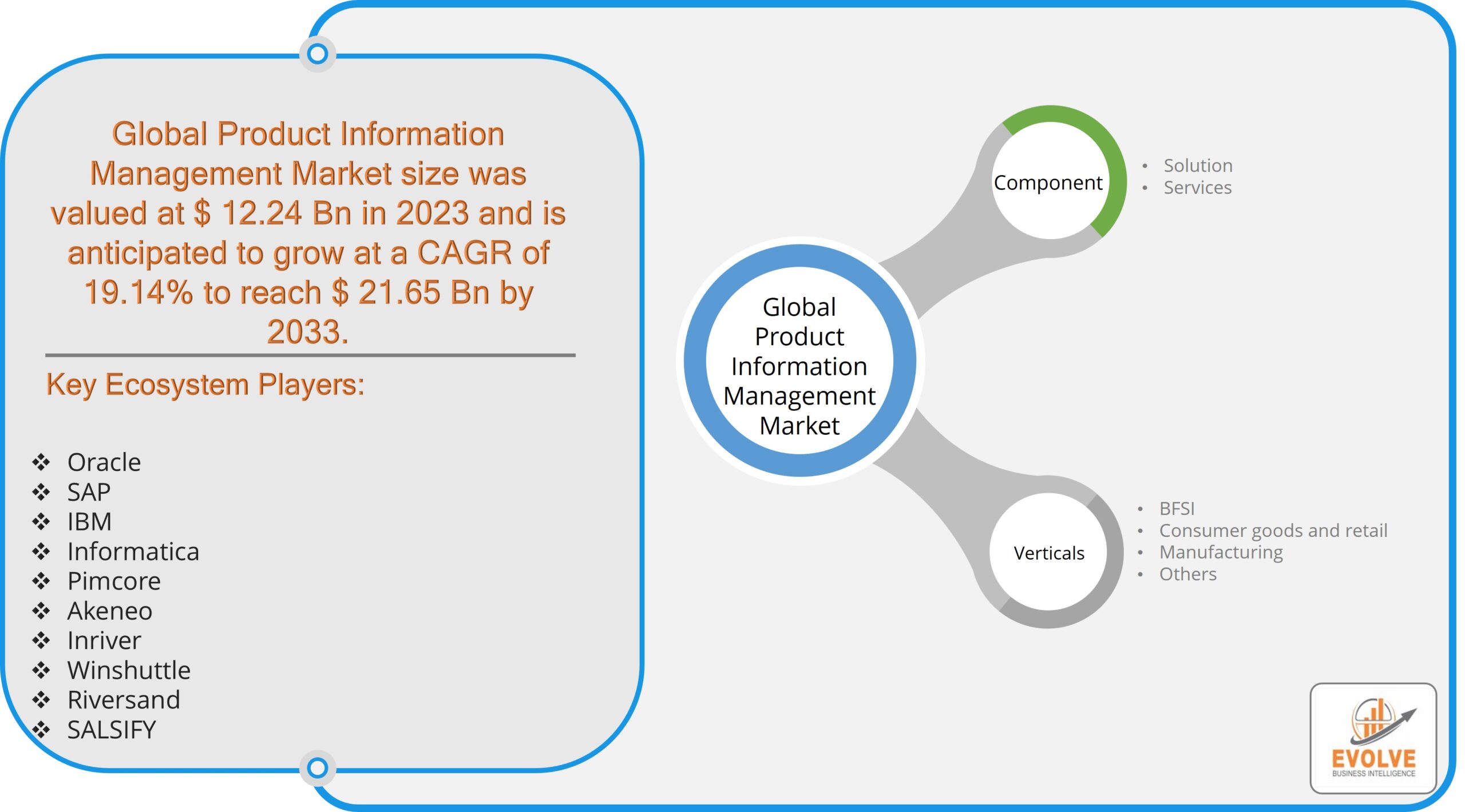Blog
The Product Information Management Market Is Estimated To Record a CAGR of Around 19.14%

Evolve Business Intelligence has published a research report on the Global Product Information Management Market, 2023–2033. The global Product Information Management market is projected to exhibit a CAGR of around 19.14%during the forecast period of 2023 to 2033.
Evolve Business Intelligence has recognized the following companies as the key players in the global Product Information Management Market: Oracle, SAP, IBM, Informatica, Pimcore, Akeneo, Inriver, Winshuttle, Riversand, SALSIFY
For More Information: https://evolvebi.com/report/product-information-management-market-analysis/
Product Information Management Market Highlights
The Global Product Information Management market is projected to be valued at USD 21.65 Billion by 2033, recording a CAGR of around 19.14% during the forecast period. The Product Information Management (PIM) market focuses on systems and processes that manage all the information required to market and sell products through distribution channels. PIM solutions centralize and manage product data, ensuring accuracy, consistency, and up-to-date information across multiple channels. These systems are crucial for businesses with extensive product catalogs, helping streamline product management, improve data quality, and enhance customer experiences. PIM supports various functions including data collection, data enrichment, catalog management, and data distribution. The market is driven by the growing need for efficient product data management and the increasing complexity of product information across various industries
The COVID-19 pandemic has led to supply chain disruptions leading to supply shortages or lower demand in the Product Information Management market. The travel restrictions and social-distancing measures have resulted in a sharp drop in consumer and business spending and this pattern is to continue for some time. The end-user trend and preferences have changed due to the pandemic and have resulted in manufacturers, developers, and service providers to adopt various strategies to stabilize the company.
Segmental Analysis
The global Product Information Management market has been segmented based on Component, Verticals
Based on Component, the market is segmented based on Solution, Services. the Solution segment dominates. This is due to the critical need for robust PIM software solutions that centralize and manage comprehensive product data, ensuring accuracy and consistency across multiple distribution channels.
Based on Verticalss, the market has been divided into the BFSI, Consumer goods and retail, Manufacturing, Others. the Consumer Goods and Retail sector dominates the Product Information Management (PIM) market. This dominance is driven by the sector’s high demand for accurate and consistent product data across multiple channels to enhance customer experience and support extensive product catalogs.
For More Information: https://evolvebi.com/report/product-information-management-market-analysis/
Regional Analysis
The Product Information Management market is divided into five regions: North America, Europe, Asia-Pacific, South America, and the Middle East, &Africa. North America holds a dominant position in the Product Information Management Market. Due to rising e-commerce traffic and the growing adoption of this solution in the retail and e-commerce industries, which boosts e-commerce sales in North American nations like the United States and Canada, the North American PIM market area is expected to lead this market. Furthermore, the increasing quantity of fitness centers and health clubs opening will fuel market expansion in this area. The Asia-Pacific region has indeed emerged as the fastest-growing market for the Product Information Management industry. From 2023 to 2032, the Asia-Pacific Production Information Management (PIM) Market is anticipated to develop at the quickest compound annual growth rate (CAGR). This is a result of the rise in online commerce and the usage of high-speed broadband and the internet by additional countries in the region. In the e-commerce industry, this software is highly needed because to the growing number of foreign e-commerce companies operating in China and India, such as Amazon, Alibaba, Flipkart, Snapdeal, and many more.



